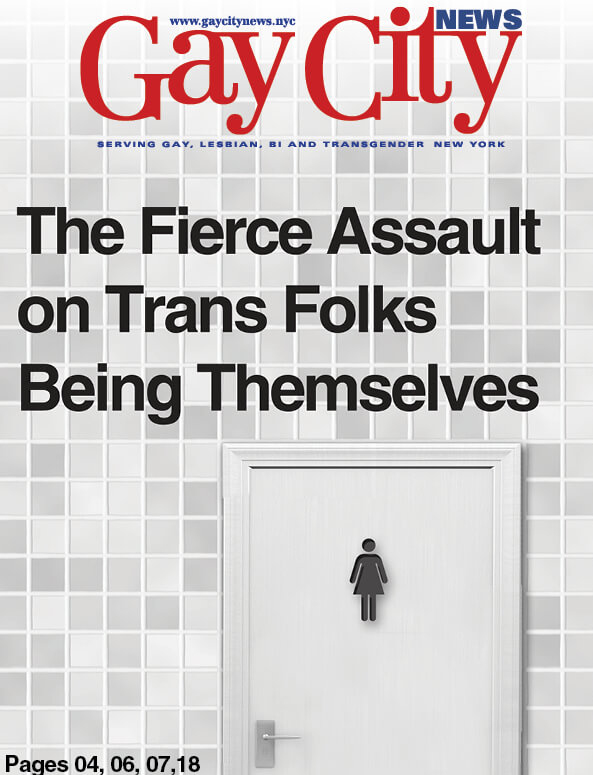COVER DESIGN BY MICHAEL SHIREY
A federal judge in Michigan has ruled that a funeral home that discharged a transgender funeral director because of her intention to dress according to the employer’s dress code for women was not liable for sex discrimination under Title VII of the 1964 Civil Rights Act.
The August 18 ruling by District Judge Sean F. Cox, which granted the Harris Funeral Homes, which has three locations in the Detroit area, its motion for summary judgment, based on its free exercise of religion defense raised under the federal Religious Freedom Restoration Act (RFRA).
The plaintiff in the case, the Equal Employment Opportunity Commission (EEOC), a federal agency that enforces Title VII, failed to show that requiring Harris Funeral Homes to allow Aimee Stephens to wear the approved female outfit was the “least restrictive alternative” in achieving the government’s compelling interest in preventing sex stereotyping discrimination in the workplace, the judge found.
Federal judge grants Michigan business religious out from sex stereotyping liability
Significantly, Cox made clear in his opinion that had Stephens sued the funeral home on her own behalf, Harris would not have been able to raise the RFRA religious freedom defense, and she would most likely have won her Title VII case. Under Sixth Circuit precedent, by which the Michigan court is bound, a RFRA defense may only be raised in a case where “the government” is either the plaintiff or the defendant.
There is some disagreement among circuit courts of appeal on this point, and the Supreme Court has never made clear whether RFRA is limited in this way. But in its controversial 2014 Hobby Lobby decision, the high court ruled that business corporations may claim protection from government actions under RFRA — in that case, the Obama administration’s requirement that employer health plans cover contraceptives. Responding to Justice Ruth Bader Ginsberg’s warning, in her dissent, that the decision would endanger the enforcement of Title VII and other anti-discrimination laws, Justice Samuel Alito, writing for the majority, argued that that an employer would not be able to rely on RFRA to defend against a Title VII race discrimination charge. That statement, however, was “dicta,” language that is not part of the ruling’s precedent. Alito made no distinction between cases brought by the EEOC and those brought by individual employees.
Hired as Anthony Stephens in 2007, Stephens, a funeral director and embalmer, informed Thomas Rost, the owner of 90 percent of Harris Funeral Homes, in writing of her intention to transition in 2013, explaining that as part of the process she would live and work full-time as a woman for a year prior to undergoing “sex reassignment surgery.”
Rost responded to the letter by firing Stephens, according to his own testimony.
“Anthony, this is not going to work out,” Rost recalled telling Stephens. “And that your services would no longer be needed here.”
Stephens filed a sex discrimination charge with the EEOC, alleging she was fired due to her sex and gender identity. After investigating the charge, the EEOC concluded that there was “reasonable cause” to believe that Stephens’ “allegations are true.” The EEOC also concluded, as a result of its investigation, that Harris discriminated against its female employees because it provided appropriate suits and ties for male employees but required female employees to assume all expenses of complying with the company dress code.
Given the EEOC’s increased commitment to litigating gender identity discrimination cases itself, the agency filed suit in the Eastern District of Michigan in September 2014.
In response, Harris filed a motion to dismiss the case, claiming that gender identity discrimination claims are not covered under Title VII. At this point, the funeral home did not mention any religious freedom claim under RFRA.
Judge Cox agreed that gender identity discrimination claims are not covered, as such, but refused to dismiss the Title VII claim, concluding it was covered by Sixth Circuit precedent involving transgender public employees who sued on a theory of “sex stereotyping” — an avenue for sex discrimination claims dating back to a 1989 Supreme Court ruling about a woman denied a promotion because she was seen as insufficiently feminine.
After Harris lost its motion to dismiss, it got new legal representation from the Alliance Defending Freedom (ADF), a so-called Christian public interest law firm, which raised for the first time the claim that the funeral home had the right to discharge Stephens regardless of Title VII because Rost’s objection to her proposed mode of dress was based on his religious views against transgender status.
Rost asserted his belief that gender and biological sex are created by God and immutable. During discovery, ADF presented evidence, not questioned by the EEOC, that this was Rost’s sincere religious belief and that he had consistently expressed his intention to operate this family-owned corporate business in line with his religious beliefs. Harris’ website and literature provide evidence to back up that claim.
Cox’s August 18 ruling did, in fact, find that Harris violated Title VII by discharging Stephens over the anticipated dress code violation. While some appellate rulings uphold the right of employers to condition employment on a formal dress code, Cox found that a Sixth Circuit precedent specifically rejected the idea that a dress code would necessarily insulate an employer from a charge of sex stereotyping.
However, Cox went on to find that Harris should prevail based on its RFRA defense. The funeral home argued that requiring it to allow a funeral director identified as male in its employment records to wear clothing specified for a woman presented an unacceptable burden on Rost’s right to operate his business consistent with his religious views. Cox found that the EEOC failed to show that requiring the funeral home to let Stephens dress as a woman was the “least restrictive alternative” to achieve the government’s compelling interest in preventing workplace sex stereotyping.
Cox noted that the EEOC had not presented any evidence of an attempt to negotiate with the funeral home about some sort of gender-neutral dress code that might be acceptable to both Stephens and Rost, and there was deposition testimony by Rost suggesting that a pants suit might be an acceptable compromise.
Cox concluded his opinion by responding to the EEOC’s contention his ruling would severely undermine enforcement of Title VII. The judge pointed out that under Sixth Circuit precedent the funeral home would not have been able to raise the RFRA defense if Stephens had filed suit against it directly.
“In the vast majority of Title VII employment discrimination cases,” Cox wrote, “the case is brought by the employee, not the EEOC. Accordingly, at least in the Sixth and Seventh Circuits, it appears that there cannot be a RFRA defense in a Title VII case brought by an employee against a private employer because that would be a case between private parties.”
Since Cox had rejected all of the other defenses offered by the funeral home under Title VII, it seems that Stephens would have won on the motion for summary judgment had she sued directly, leaving RFRA out of the picture.
Cox declined to take up the EEOC’s claim that the funeral home discriminated generally against its women employees, finding that this claim did not relate to the issues in Stephens’ complaint and should be dealt with separately. In any event, the funeral home reacted to the EEOC’s investigation by changing its dress policy to provide financial assistance to female employees as well as males.
Cox was appointed to the court by President George W. Bush and is the older brother of former Michigan Attorney General Mike Cox.
The American Civil Liberties Union of Michigan filed an amicus brief in support of Stephens and the EEOC.



































